
Recessed living rooms used to be popular but have fallen out of favor. This guide discusses the cost to raise a sunken living room to modernize your home.
Deck out your ceiling with one of these popular options


The right types of ceiling tiles balance your home’s reverberation, increase your home’s energy efficiency, and amp up your aesthetics. There are six main types of ceiling tiles: fiberglass, medium-density fiberboard, metal, mineral fiber, plastic, and wood. There are even more variations and options within those main types. Whether you’re looking for noise cancellation features or the perfect visual effect to pull in your style, read through the types of ceiling tiles to get a head start on the possibilities before contacting a ceiling pro.
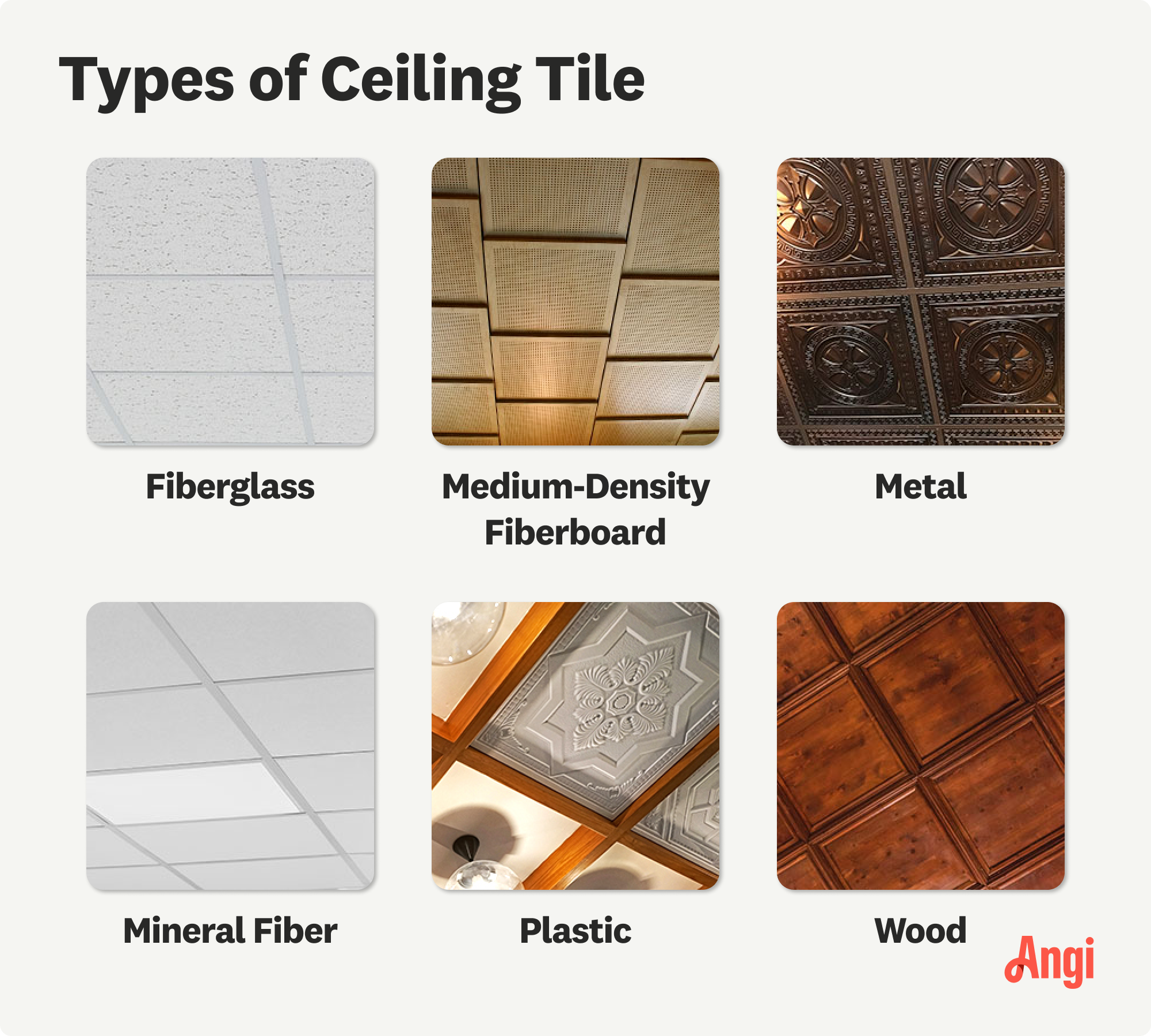
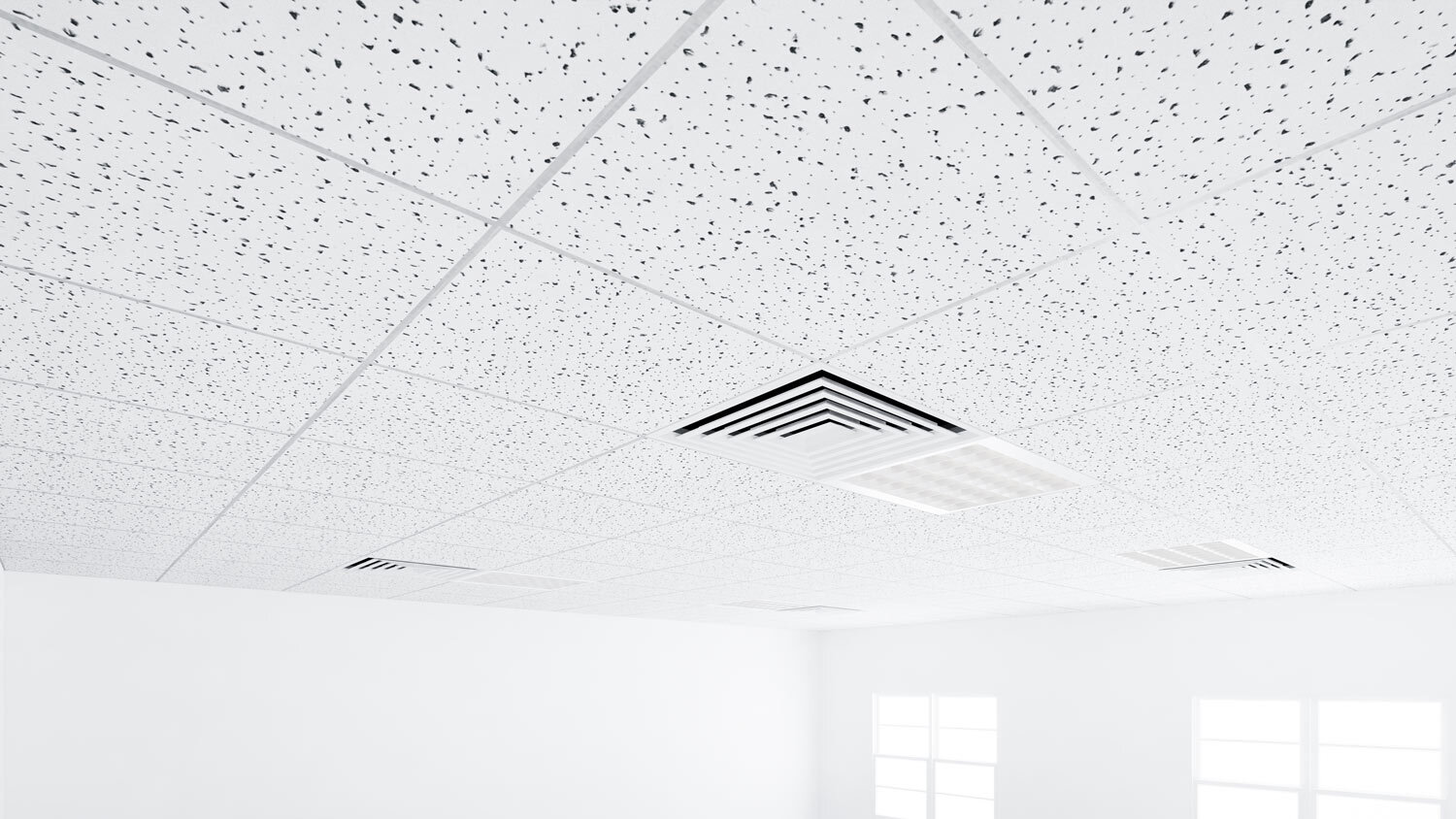
Fiberglass ceiling tiles come from resin-bound glass fibers that are baked into tiles. This material is fire-resistant and moisture-resistant, great as an insulator and noise cancellation feature, and can help maintain your indoor temperature, saving you energy. The tiles are also low-maintenance and easy to clean. The average cost for fiberglass ceiling tiles is around $1 to $9 per square foot.
At the same time, fiberglass, like many other manufactured ceiling tiles, can release harmful airborne particles called volatile organic compounds (VOCs). The material is also more prone to fading, scratches, and other visual signs of damage over time.
| Pros | Cons |
|---|---|
| Moisture- and fire-resistant | Less aesthetically pleasing |
| Excellent sound absorption | Can release VOCs |
| Durable | Scratches more easily |
Best for: Quiet spaces, moist climates, and homes in fire zones
If you want wood ceiling tiles, medium-density fiberboard (MDF) ceiling tiles are the closest you can get. Wood is heavy, but MDF tiles use engineered wood fibers and resin to achieve the same visual effect you’d have with solid wood—without the added weight. These tiles are dense, durable, and paint-friendly. The resin also helps make MDF tiles more moisture-resistant than traditional wood boards.
MDF ceiling tiles have a few disadvantages to consider. For one, the tiles fall at the high end of the price range, with MDF costs ranging from $8 to $20 per square foot, depending on the quality. However, you can save on costs by priming and finishing the boards yourself. Unfinished MDF costs around $0.50 to $2 per square foot. Another downside is that MDF can emit formaldehyde gas, which can negatively affect the air quality and lead to respiratory problems.
Since MDF ceiling tiles are heavier than your average ceiling tile, you may have a harder time learning how to install ceiling tiles. We recommend working with a pro to install them.
| Pros | Cons |
|---|---|
| Warp-resistant | Higher cost for finished boards |
| Can mimic hardwood appearance | May emit harmful gases |
| Moisture-resistant | Heavier to install |
Best for: Homeowners who want wood ceiling tiles without the cost and weight of solid wood
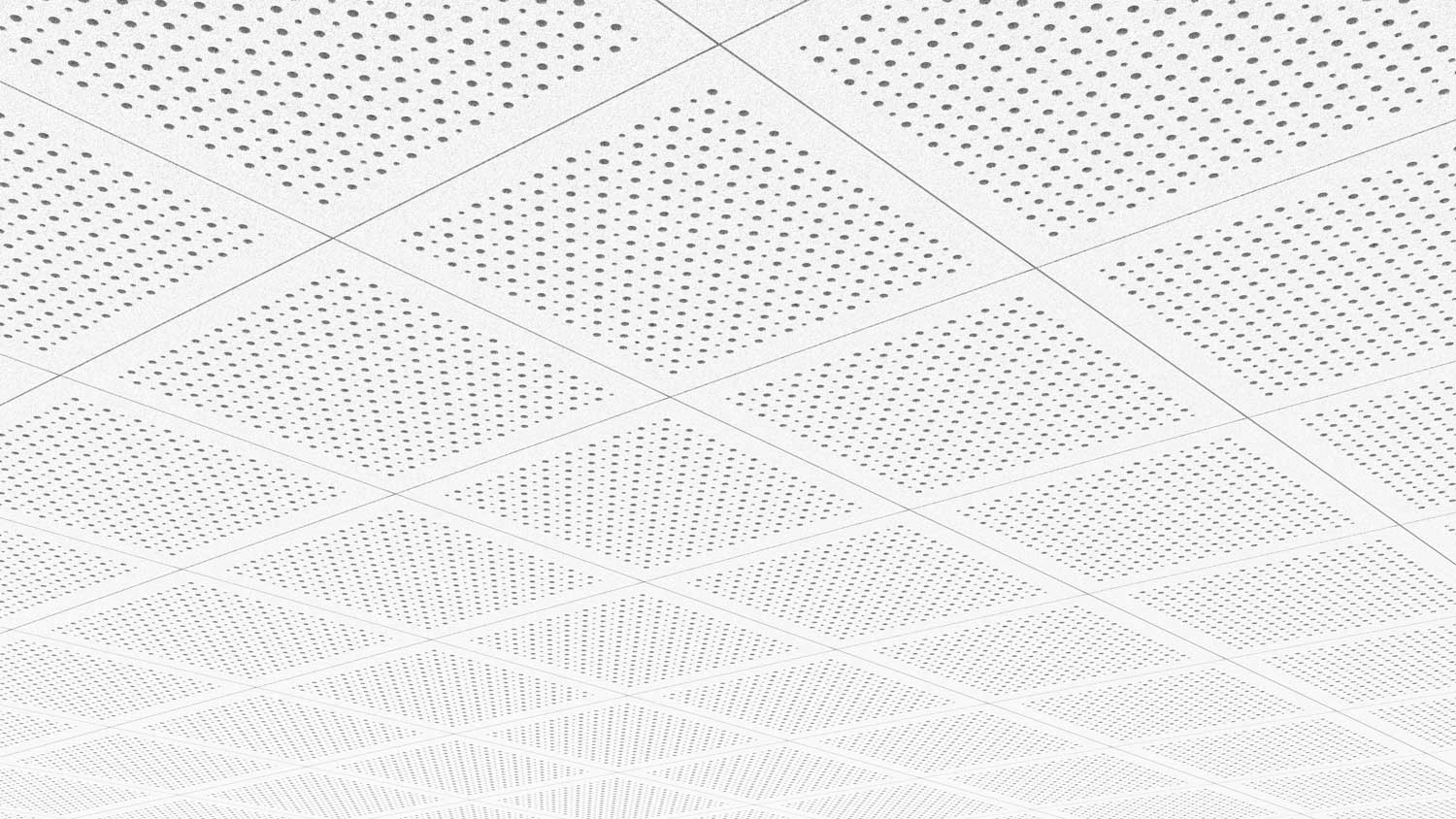
One of the most versatile types of ceiling tiles is metal. These tiles come from aluminum, copper, galvanized steel, or tin. Metal tiles aren’t prone to water damage, nor are they flammable. They tend to last longer than other materials, too.
Because metal is so flexible, it works well for all types of ceilings, making it a breeze to customize your ceiling tiles by adding elaborate textures and design elements that would otherwise cost significantly more for other materials that aren’t as malleable.
Metal ceiling tiles do come with a few downsides, however. The tiles have a way of amplifying sounds. This can make it noisier in your home and cause issues for those who are hard of hearing if you don’t choose acoustic backing. For this reason, metal may not be the best choice for an accessibility-friendly home. Metal tiles also cost more than the average drop ceiling tile cost, with prices ranging from $12 to $20 per square foot, depending on the material and ceiling tile size.
Lastly, while metal is easy to repair with a simple buff, some materials, like aluminum and tin, scratch easily. But this may not be a concern for ceilings.
| Pros | Cons |
|---|---|
| Long-lasting | Higher cost |
| Easy to repair | More visible scratches |
| Can be lightweight | Noisier living space |
Best for: Modern, industrial, or antique-style homes
Mineral fiber ceiling tiles are the most affordable type of ceiling tiles, coming in at just $1 to $4 per square foot on average. Made from a combination of rocks, recycled newspaper, clay, fiberglass, mineral wool, slag, and binding agents, this type of tile has superior acoustic effects, making it ideal for anyone wanting a quiet home. Mineral fiber tiles are also fire-resistant and textured throughout so that surface damage is less noticeable.
On the downside, mineral fiber ceiling tiles aren’t as durable as most other options, nor are they considered attractive. The tiles are fragile, sensitive to water damage, and may contain ingredients like formaldehyde, which can cause respiratory issues for those with allergies, asthma, or other breathing problems.
| Pros | Cons |
|---|---|
| Excellent noise absorption | Susceptible to water damage |
| Less surface damage visibility | Shorter lifespan |
| Fire-resistant | Can cause respiratory issues |
Best for: High-traffic locations where noise cancellation is preferred
Plastic ceiling tiles are made of PVC, polyurethane, or polystyrene foam. For a budget-friendly ceiling tile that can mimic the appearance of any style without the high price tag, plastic ceiling tiles are a good alternative, coming in between $5 and $9 per square foot. Some plastic tiles resemble natural wood, while others are 3D-printed in elaborate designs. You can choose from all kinds of textures, and the material is often lightweight.
Plastic tiles are usually very soundproof, making them a good choice for studios and spaces where noise cancellation is a must. PVC tiles have one of the longest lifespans and are waterproof, making them ideal for bathrooms.
The main downsides are that plastic ceiling tiles tend to have shorter lifespans than other materials, and the materials are flammable. This makes them less suitable for kitchens and areas at risk of fire. In addition, when plastic ceiling tiles burn, they can release VOCs that negatively affect air quality.
| Pros | Cons |
|---|---|
| Cost-friendly | Shorter lifespan |
| Easy to install | May release VOCs |
| Great insulators | Flammable |
Best for: Studios, bathrooms, or moist areas (excluding kitchens) where heat isn’t an issue
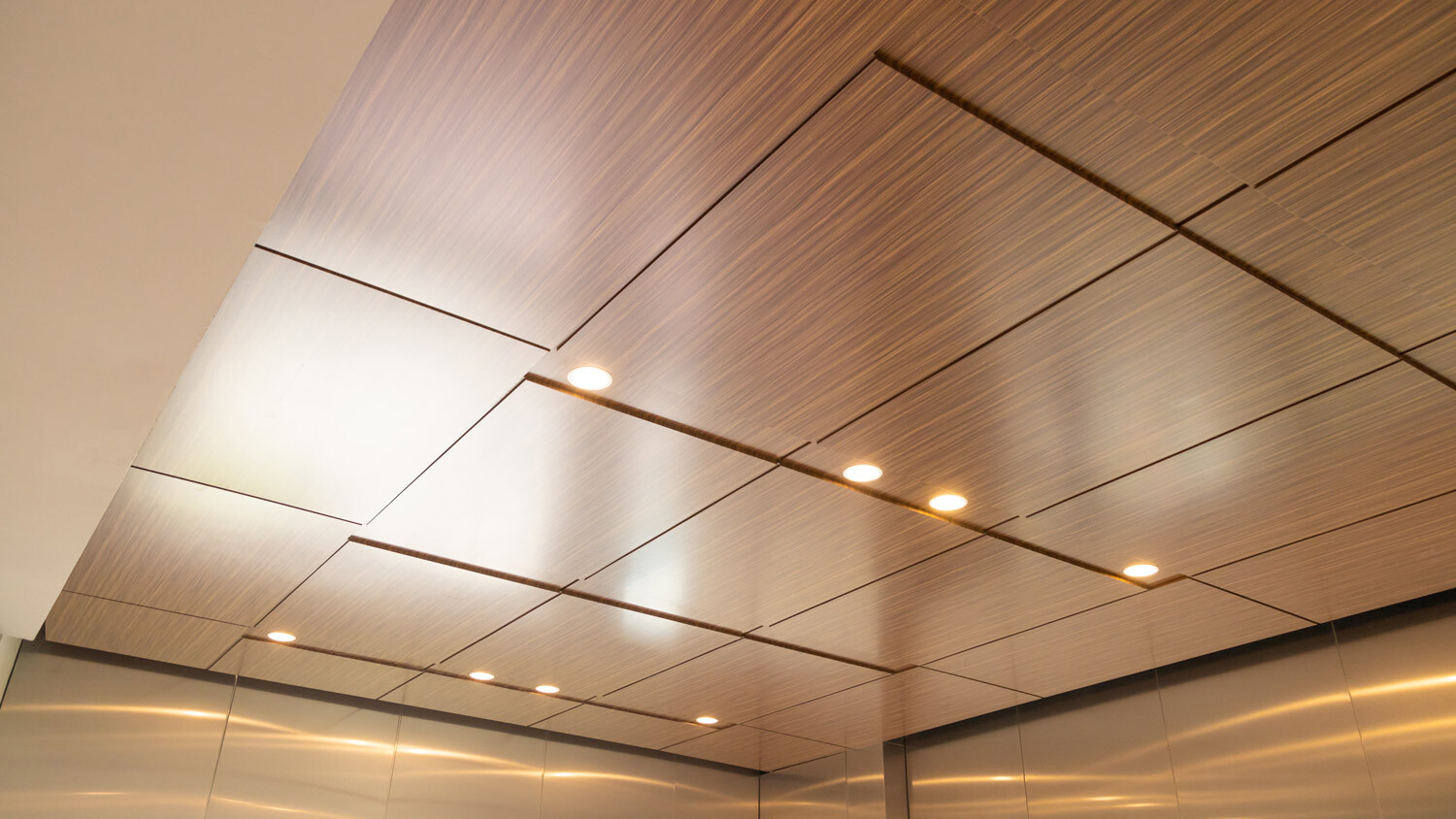
Natural wood carries a lot of weight, which isn’t ideal for a ceiling. But with wooden veneer drop ceiling tiles, you can still get the charm of real wood without the weight or high price tag. Wood ceiling tiles cost between $1 and $8 per square foot on average, with pine costing the least and walnut and mahogany costing the most. Wood ceiling tiles offer good noise absorption and insulation but are susceptible to moisture damage and require routine ceiling maintenance.
If you’re installing solid wood tiles, the process typically involves a tongue-and-groove ceiling type, which is more challenging to install than drop ceiling tiles or drywall. As a result, you may end up spending more on hiring a local ceiling tile company to install the tiles.
| Pros | Cons |
|---|---|
| Natural, inviting aestheti | Harder to install |
| Insulating | Not DIY-friendly |
| Reduces reverberation | Moisture prone |
Best for: Rustic or modern homes with natural elements
Knowing your personal preferences can help you choose the right ceiling tiles for your home. Here are a few questions to ask yourself before deciding:
What is your budget?
Do you prefer natural materials?
Where do you plan to install the ceiling tiles?
Is noise cancellation a key feature for your home?
How much maintenance are you willing to invest in a ceiling?
What aesthetics are you going for?
Do you live in a climate with extreme heat or cold?
Is humidity and excessive rainfall common in your area?
Are you in a fire zone?
What type of ceiling method do you plan to use?
From average costs to expert advice, get all the answers you need to get your job done.

Recessed living rooms used to be popular but have fallen out of favor. This guide discusses the cost to raise a sunken living room to modernize your home.

Installing a dumbwaiter can save you time and energy. Learn how much a dumbwaiter costs with this guide.

When your home project requires a professional at the helm, how much are construction management fees, and how do they determine their rate? Let's break it down.
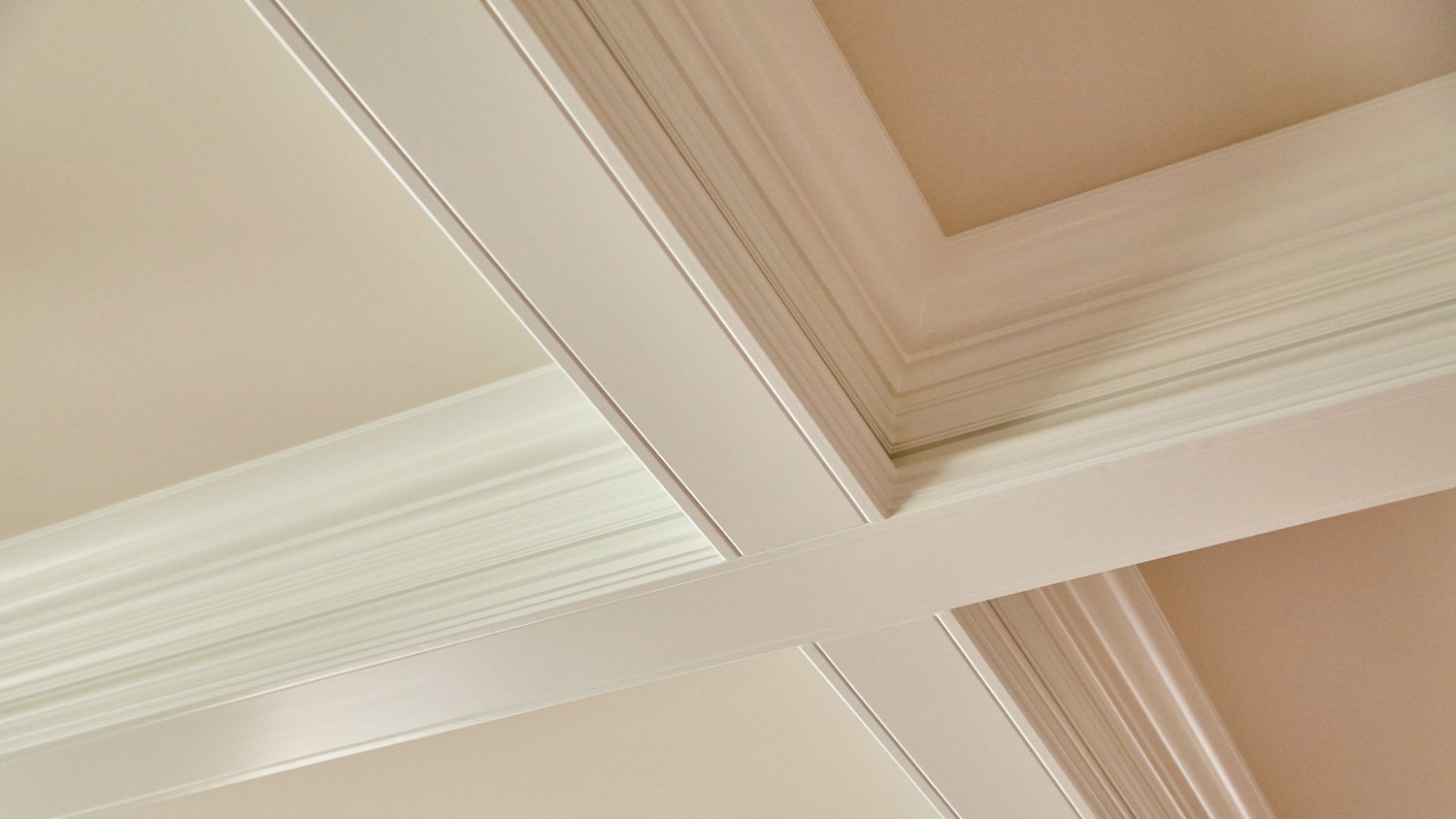
Not sure what the difference is between coffered and tray ceilings? Learn the key distinctions in design, cost, and benefits to decide which ceiling style is best for your home.
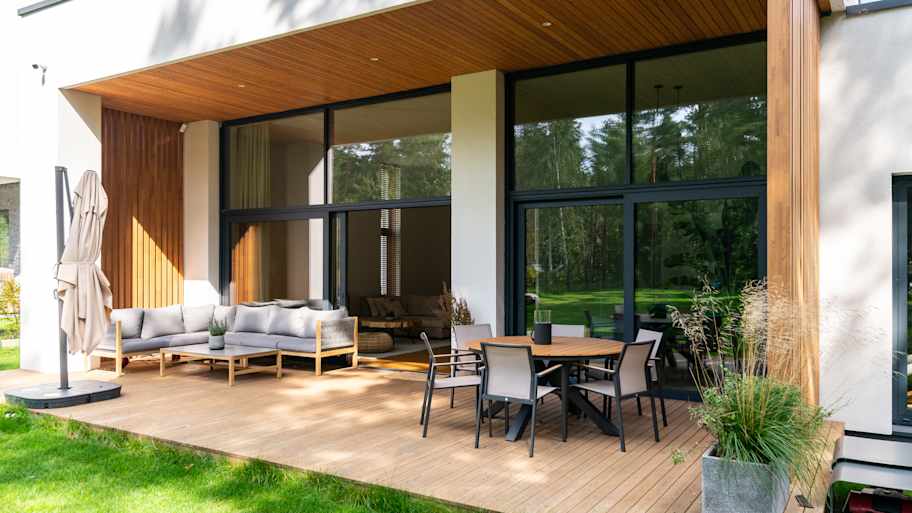
Deciding between using cedar vs pressure-treated wood for your outdoor project comes down to budget, appearance, durability, maintenance, and other factors.

The cost to install a wheelchair platform depends on size, type, labor, and other factors. See how much your wheelchair platform could cost.